Critical Evaluation: Psychobiological vs Social Theories of Addiction
VerifiedAdded on 2023/06/15
|8
|2455
|157
Essay
AI Summary
This essay provides a critical evaluation of various theories related to addiction, focusing on both psychobiological and social psychological perspectives. The psychobiological theories discussed include positive reinforcement, negative reinforcement, and response inhibition, each offering a biological understanding of substance dependence. The social psychological theories explored are family interaction theory, peer cluster theory, and social learning theory, which emphasize the influence of family, peers, and society on addictive behaviors. The essay concludes by highlighting the importance of understanding these different approaches to effectively address and overcome addiction, noting that both psycho-biological and social psychology theories can effectively aid people to overcome their addiction. Desklib provides access to this essay and other resources for students.
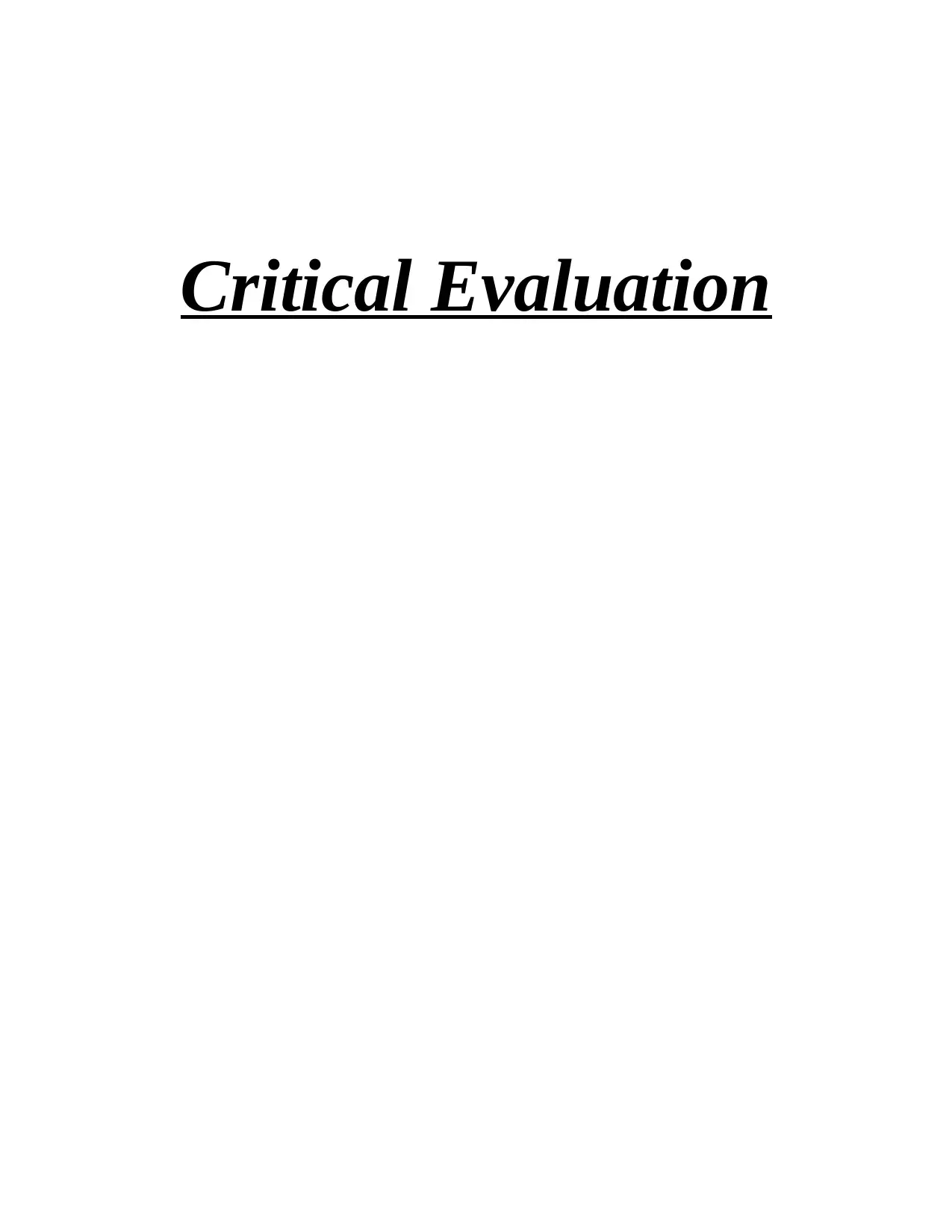
Critical Evaluation
Paraphrase This Document
Need a fresh take? Get an instant paraphrase of this document with our AI Paraphraser
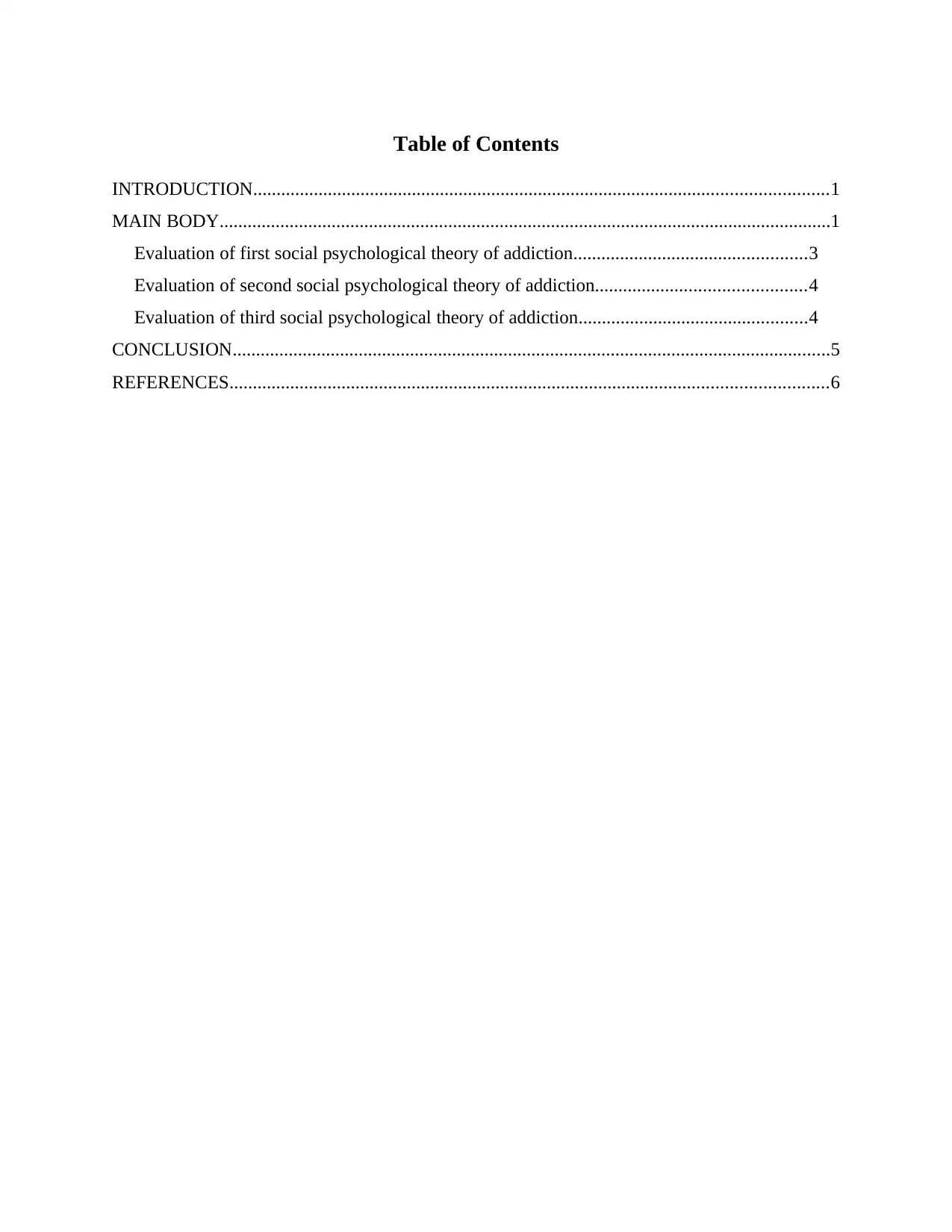
Table of Contents
INTRODUCTION...........................................................................................................................1
MAIN BODY...................................................................................................................................1
Evaluation of first social psychological theory of addiction..................................................3
Evaluation of second social psychological theory of addiction.............................................4
Evaluation of third social psychological theory of addiction.................................................4
CONCLUSION................................................................................................................................5
REFERENCES................................................................................................................................6
INTRODUCTION...........................................................................................................................1
MAIN BODY...................................................................................................................................1
Evaluation of first social psychological theory of addiction..................................................3
Evaluation of second social psychological theory of addiction.............................................4
Evaluation of third social psychological theory of addiction.................................................4
CONCLUSION................................................................................................................................5
REFERENCES................................................................................................................................6
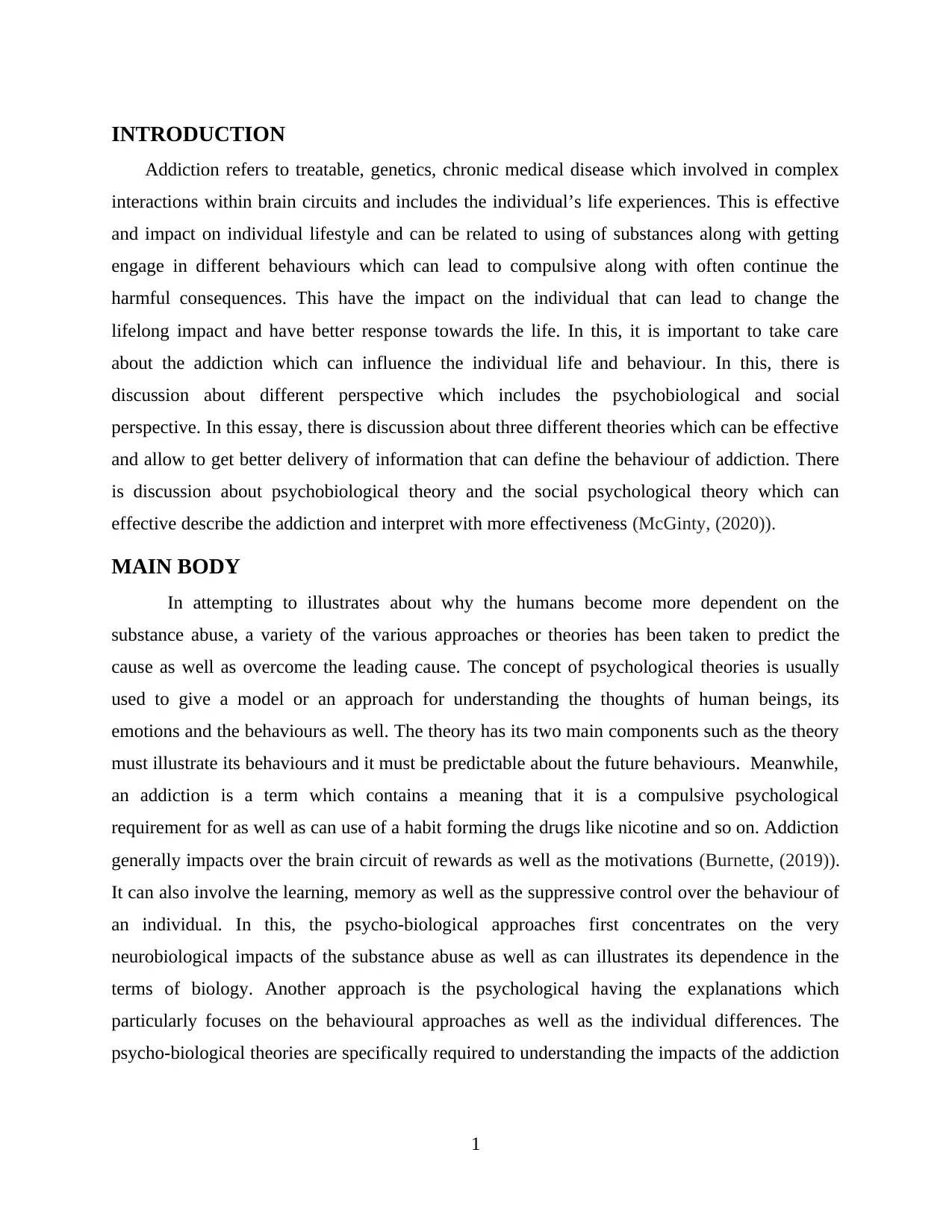
INTRODUCTION
Addiction refers to treatable, genetics, chronic medical disease which involved in complex
interactions within brain circuits and includes the individual’s life experiences. This is effective
and impact on individual lifestyle and can be related to using of substances along with getting
engage in different behaviours which can lead to compulsive along with often continue the
harmful consequences. This have the impact on the individual that can lead to change the
lifelong impact and have better response towards the life. In this, it is important to take care
about the addiction which can influence the individual life and behaviour. In this, there is
discussion about different perspective which includes the psychobiological and social
perspective. In this essay, there is discussion about three different theories which can be effective
and allow to get better delivery of information that can define the behaviour of addiction. There
is discussion about psychobiological theory and the social psychological theory which can
effective describe the addiction and interpret with more effectiveness (McGinty, (2020)).
MAIN BODY
In attempting to illustrates about why the humans become more dependent on the
substance abuse, a variety of the various approaches or theories has been taken to predict the
cause as well as overcome the leading cause. The concept of psychological theories is usually
used to give a model or an approach for understanding the thoughts of human beings, its
emotions and the behaviours as well. The theory has its two main components such as the theory
must illustrate its behaviours and it must be predictable about the future behaviours. Meanwhile,
an addiction is a term which contains a meaning that it is a compulsive psychological
requirement for as well as can use of a habit forming the drugs like nicotine and so on. Addiction
generally impacts over the brain circuit of rewards as well as the motivations (Burnette, (2019)).
It can also involve the learning, memory as well as the suppressive control over the behaviour of
an individual. In this, the psycho-biological approaches first concentrates on the very
neurobiological impacts of the substance abuse as well as can illustrates its dependence in the
terms of biology. Another approach is the psychological having the explanations which
particularly focuses on the behavioural approaches as well as the individual differences. The
psycho-biological theories are specifically required to understanding the impacts of the addiction
1
Addiction refers to treatable, genetics, chronic medical disease which involved in complex
interactions within brain circuits and includes the individual’s life experiences. This is effective
and impact on individual lifestyle and can be related to using of substances along with getting
engage in different behaviours which can lead to compulsive along with often continue the
harmful consequences. This have the impact on the individual that can lead to change the
lifelong impact and have better response towards the life. In this, it is important to take care
about the addiction which can influence the individual life and behaviour. In this, there is
discussion about different perspective which includes the psychobiological and social
perspective. In this essay, there is discussion about three different theories which can be effective
and allow to get better delivery of information that can define the behaviour of addiction. There
is discussion about psychobiological theory and the social psychological theory which can
effective describe the addiction and interpret with more effectiveness (McGinty, (2020)).
MAIN BODY
In attempting to illustrates about why the humans become more dependent on the
substance abuse, a variety of the various approaches or theories has been taken to predict the
cause as well as overcome the leading cause. The concept of psychological theories is usually
used to give a model or an approach for understanding the thoughts of human beings, its
emotions and the behaviours as well. The theory has its two main components such as the theory
must illustrate its behaviours and it must be predictable about the future behaviours. Meanwhile,
an addiction is a term which contains a meaning that it is a compulsive psychological
requirement for as well as can use of a habit forming the drugs like nicotine and so on. Addiction
generally impacts over the brain circuit of rewards as well as the motivations (Burnette, (2019)).
It can also involve the learning, memory as well as the suppressive control over the behaviour of
an individual. In this, the psycho-biological approaches first concentrates on the very
neurobiological impacts of the substance abuse as well as can illustrates its dependence in the
terms of biology. Another approach is the psychological having the explanations which
particularly focuses on the behavioural approaches as well as the individual differences. The
psycho-biological theories are specifically required to understanding the impacts of the addiction
1
⊘ This is a preview!⊘
Do you want full access?
Subscribe today to unlock all pages.

Trusted by 1+ million students worldwide
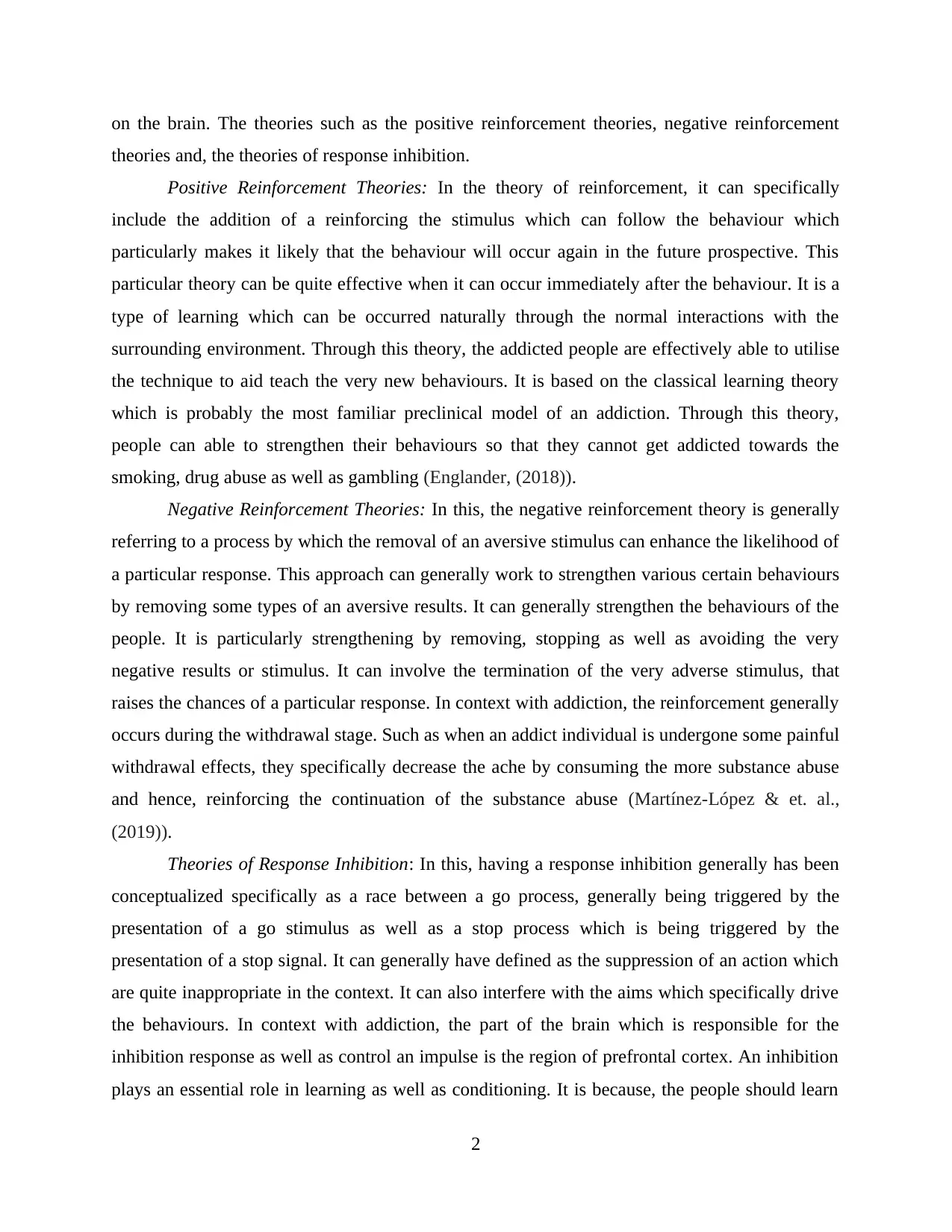
on the brain. The theories such as the positive reinforcement theories, negative reinforcement
theories and, the theories of response inhibition.
Positive Reinforcement Theories: In the theory of reinforcement, it can specifically
include the addition of a reinforcing the stimulus which can follow the behaviour which
particularly makes it likely that the behaviour will occur again in the future prospective. This
particular theory can be quite effective when it can occur immediately after the behaviour. It is a
type of learning which can be occurred naturally through the normal interactions with the
surrounding environment. Through this theory, the addicted people are effectively able to utilise
the technique to aid teach the very new behaviours. It is based on the classical learning theory
which is probably the most familiar preclinical model of an addiction. Through this theory,
people can able to strengthen their behaviours so that they cannot get addicted towards the
smoking, drug abuse as well as gambling (Englander, (2018)).
Negative Reinforcement Theories: In this, the negative reinforcement theory is generally
referring to a process by which the removal of an aversive stimulus can enhance the likelihood of
a particular response. This approach can generally work to strengthen various certain behaviours
by removing some types of an aversive results. It can generally strengthen the behaviours of the
people. It is particularly strengthening by removing, stopping as well as avoiding the very
negative results or stimulus. It can involve the termination of the very adverse stimulus, that
raises the chances of a particular response. In context with addiction, the reinforcement generally
occurs during the withdrawal stage. Such as when an addict individual is undergone some painful
withdrawal effects, they specifically decrease the ache by consuming the more substance abuse
and hence, reinforcing the continuation of the substance abuse (Martínez-López & et. al.,
(2019)).
Theories of Response Inhibition: In this, having a response inhibition generally has been
conceptualized specifically as a race between a go process, generally being triggered by the
presentation of a go stimulus as well as a stop process which is being triggered by the
presentation of a stop signal. It can generally have defined as the suppression of an action which
are quite inappropriate in the context. It can also interfere with the aims which specifically drive
the behaviours. In context with addiction, the part of the brain which is responsible for the
inhibition response as well as control an impulse is the region of prefrontal cortex. An inhibition
plays an essential role in learning as well as conditioning. It is because, the people should learn
2
theories and, the theories of response inhibition.
Positive Reinforcement Theories: In the theory of reinforcement, it can specifically
include the addition of a reinforcing the stimulus which can follow the behaviour which
particularly makes it likely that the behaviour will occur again in the future prospective. This
particular theory can be quite effective when it can occur immediately after the behaviour. It is a
type of learning which can be occurred naturally through the normal interactions with the
surrounding environment. Through this theory, the addicted people are effectively able to utilise
the technique to aid teach the very new behaviours. It is based on the classical learning theory
which is probably the most familiar preclinical model of an addiction. Through this theory,
people can able to strengthen their behaviours so that they cannot get addicted towards the
smoking, drug abuse as well as gambling (Englander, (2018)).
Negative Reinforcement Theories: In this, the negative reinforcement theory is generally
referring to a process by which the removal of an aversive stimulus can enhance the likelihood of
a particular response. This approach can generally work to strengthen various certain behaviours
by removing some types of an aversive results. It can generally strengthen the behaviours of the
people. It is particularly strengthening by removing, stopping as well as avoiding the very
negative results or stimulus. It can involve the termination of the very adverse stimulus, that
raises the chances of a particular response. In context with addiction, the reinforcement generally
occurs during the withdrawal stage. Such as when an addict individual is undergone some painful
withdrawal effects, they specifically decrease the ache by consuming the more substance abuse
and hence, reinforcing the continuation of the substance abuse (Martínez-López & et. al.,
(2019)).
Theories of Response Inhibition: In this, having a response inhibition generally has been
conceptualized specifically as a race between a go process, generally being triggered by the
presentation of a go stimulus as well as a stop process which is being triggered by the
presentation of a stop signal. It can generally have defined as the suppression of an action which
are quite inappropriate in the context. It can also interfere with the aims which specifically drive
the behaviours. In context with addiction, the part of the brain which is responsible for the
inhibition response as well as control an impulse is the region of prefrontal cortex. An inhibition
plays an essential role in learning as well as conditioning. It is because, the people should learn
2
Paraphrase This Document
Need a fresh take? Get an instant paraphrase of this document with our AI Paraphraser
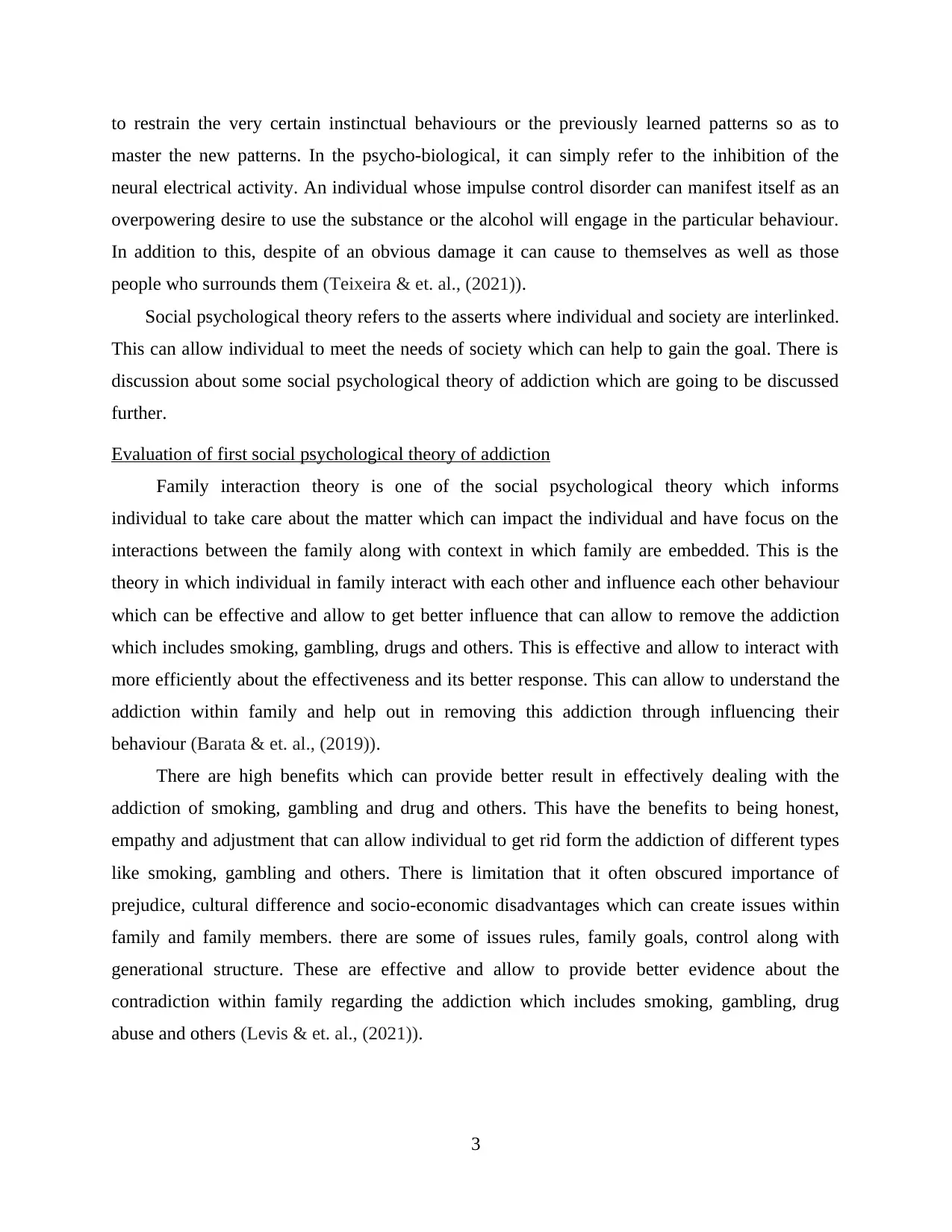
to restrain the very certain instinctual behaviours or the previously learned patterns so as to
master the new patterns. In the psycho-biological, it can simply refer to the inhibition of the
neural electrical activity. An individual whose impulse control disorder can manifest itself as an
overpowering desire to use the substance or the alcohol will engage in the particular behaviour.
In addition to this, despite of an obvious damage it can cause to themselves as well as those
people who surrounds them (Teixeira & et. al., (2021)).
Social psychological theory refers to the asserts where individual and society are interlinked.
This can allow individual to meet the needs of society which can help to gain the goal. There is
discussion about some social psychological theory of addiction which are going to be discussed
further.
Evaluation of first social psychological theory of addiction
Family interaction theory is one of the social psychological theory which informs
individual to take care about the matter which can impact the individual and have focus on the
interactions between the family along with context in which family are embedded. This is the
theory in which individual in family interact with each other and influence each other behaviour
which can be effective and allow to get better influence that can allow to remove the addiction
which includes smoking, gambling, drugs and others. This is effective and allow to interact with
more efficiently about the effectiveness and its better response. This can allow to understand the
addiction within family and help out in removing this addiction through influencing their
behaviour (Barata & et. al., (2019)).
There are high benefits which can provide better result in effectively dealing with the
addiction of smoking, gambling and drug and others. This have the benefits to being honest,
empathy and adjustment that can allow individual to get rid form the addiction of different types
like smoking, gambling and others. There is limitation that it often obscured importance of
prejudice, cultural difference and socio-economic disadvantages which can create issues within
family and family members. there are some of issues rules, family goals, control along with
generational structure. These are effective and allow to provide better evidence about the
contradiction within family regarding the addiction which includes smoking, gambling, drug
abuse and others (Levis & et. al., (2021)).
3
master the new patterns. In the psycho-biological, it can simply refer to the inhibition of the
neural electrical activity. An individual whose impulse control disorder can manifest itself as an
overpowering desire to use the substance or the alcohol will engage in the particular behaviour.
In addition to this, despite of an obvious damage it can cause to themselves as well as those
people who surrounds them (Teixeira & et. al., (2021)).
Social psychological theory refers to the asserts where individual and society are interlinked.
This can allow individual to meet the needs of society which can help to gain the goal. There is
discussion about some social psychological theory of addiction which are going to be discussed
further.
Evaluation of first social psychological theory of addiction
Family interaction theory is one of the social psychological theory which informs
individual to take care about the matter which can impact the individual and have focus on the
interactions between the family along with context in which family are embedded. This is the
theory in which individual in family interact with each other and influence each other behaviour
which can be effective and allow to get better influence that can allow to remove the addiction
which includes smoking, gambling, drugs and others. This is effective and allow to interact with
more efficiently about the effectiveness and its better response. This can allow to understand the
addiction within family and help out in removing this addiction through influencing their
behaviour (Barata & et. al., (2019)).
There are high benefits which can provide better result in effectively dealing with the
addiction of smoking, gambling and drug and others. This have the benefits to being honest,
empathy and adjustment that can allow individual to get rid form the addiction of different types
like smoking, gambling and others. There is limitation that it often obscured importance of
prejudice, cultural difference and socio-economic disadvantages which can create issues within
family and family members. there are some of issues rules, family goals, control along with
generational structure. These are effective and allow to provide better evidence about the
contradiction within family regarding the addiction which includes smoking, gambling, drug
abuse and others (Levis & et. al., (2021)).
3
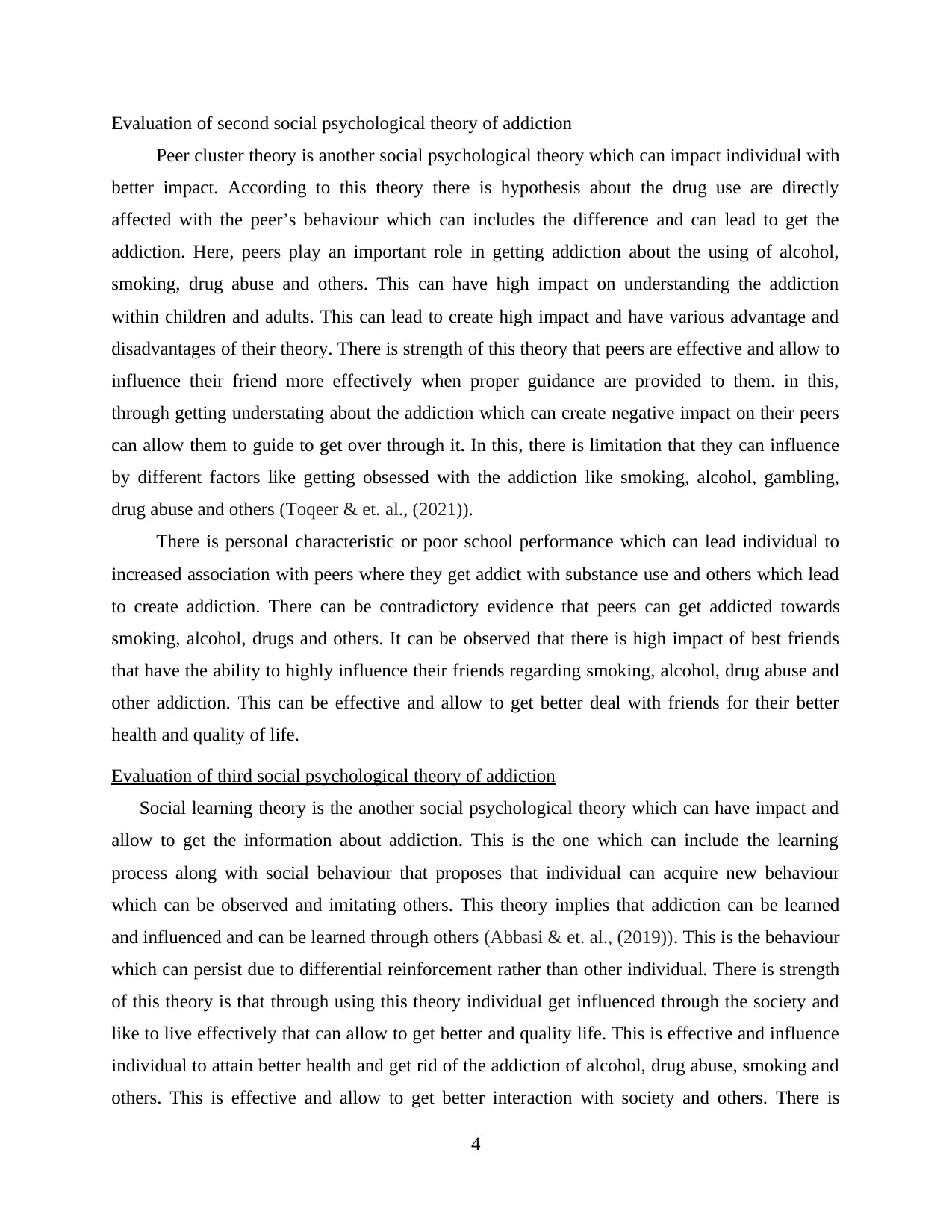
Evaluation of second social psychological theory of addiction
Peer cluster theory is another social psychological theory which can impact individual with
better impact. According to this theory there is hypothesis about the drug use are directly
affected with the peer’s behaviour which can includes the difference and can lead to get the
addiction. Here, peers play an important role in getting addiction about the using of alcohol,
smoking, drug abuse and others. This can have high impact on understanding the addiction
within children and adults. This can lead to create high impact and have various advantage and
disadvantages of their theory. There is strength of this theory that peers are effective and allow to
influence their friend more effectively when proper guidance are provided to them. in this,
through getting understating about the addiction which can create negative impact on their peers
can allow them to guide to get over through it. In this, there is limitation that they can influence
by different factors like getting obsessed with the addiction like smoking, alcohol, gambling,
drug abuse and others (Toqeer & et. al., (2021)).
There is personal characteristic or poor school performance which can lead individual to
increased association with peers where they get addict with substance use and others which lead
to create addiction. There can be contradictory evidence that peers can get addicted towards
smoking, alcohol, drugs and others. It can be observed that there is high impact of best friends
that have the ability to highly influence their friends regarding smoking, alcohol, drug abuse and
other addiction. This can be effective and allow to get better deal with friends for their better
health and quality of life.
Evaluation of third social psychological theory of addiction
Social learning theory is the another social psychological theory which can have impact and
allow to get the information about addiction. This is the one which can include the learning
process along with social behaviour that proposes that individual can acquire new behaviour
which can be observed and imitating others. This theory implies that addiction can be learned
and influenced and can be learned through others (Abbasi & et. al., (2019)). This is the behaviour
which can persist due to differential reinforcement rather than other individual. There is strength
of this theory is that through using this theory individual get influenced through the society and
like to live effectively that can allow to get better and quality life. This is effective and influence
individual to attain better health and get rid of the addiction of alcohol, drug abuse, smoking and
others. This is effective and allow to get better interaction with society and others. There is
4
Peer cluster theory is another social psychological theory which can impact individual with
better impact. According to this theory there is hypothesis about the drug use are directly
affected with the peer’s behaviour which can includes the difference and can lead to get the
addiction. Here, peers play an important role in getting addiction about the using of alcohol,
smoking, drug abuse and others. This can have high impact on understanding the addiction
within children and adults. This can lead to create high impact and have various advantage and
disadvantages of their theory. There is strength of this theory that peers are effective and allow to
influence their friend more effectively when proper guidance are provided to them. in this,
through getting understating about the addiction which can create negative impact on their peers
can allow them to guide to get over through it. In this, there is limitation that they can influence
by different factors like getting obsessed with the addiction like smoking, alcohol, gambling,
drug abuse and others (Toqeer & et. al., (2021)).
There is personal characteristic or poor school performance which can lead individual to
increased association with peers where they get addict with substance use and others which lead
to create addiction. There can be contradictory evidence that peers can get addicted towards
smoking, alcohol, drugs and others. It can be observed that there is high impact of best friends
that have the ability to highly influence their friends regarding smoking, alcohol, drug abuse and
other addiction. This can be effective and allow to get better deal with friends for their better
health and quality of life.
Evaluation of third social psychological theory of addiction
Social learning theory is the another social psychological theory which can have impact and
allow to get the information about addiction. This is the one which can include the learning
process along with social behaviour that proposes that individual can acquire new behaviour
which can be observed and imitating others. This theory implies that addiction can be learned
and influenced and can be learned through others (Abbasi & et. al., (2019)). This is the behaviour
which can persist due to differential reinforcement rather than other individual. There is strength
of this theory is that through using this theory individual get influenced through the society and
like to live effectively that can allow to get better and quality life. This is effective and influence
individual to attain better health and get rid of the addiction of alcohol, drug abuse, smoking and
others. This is effective and allow to get better interaction with society and others. There is
4
⊘ This is a preview!⊘
Do you want full access?
Subscribe today to unlock all pages.

Trusted by 1+ million students worldwide
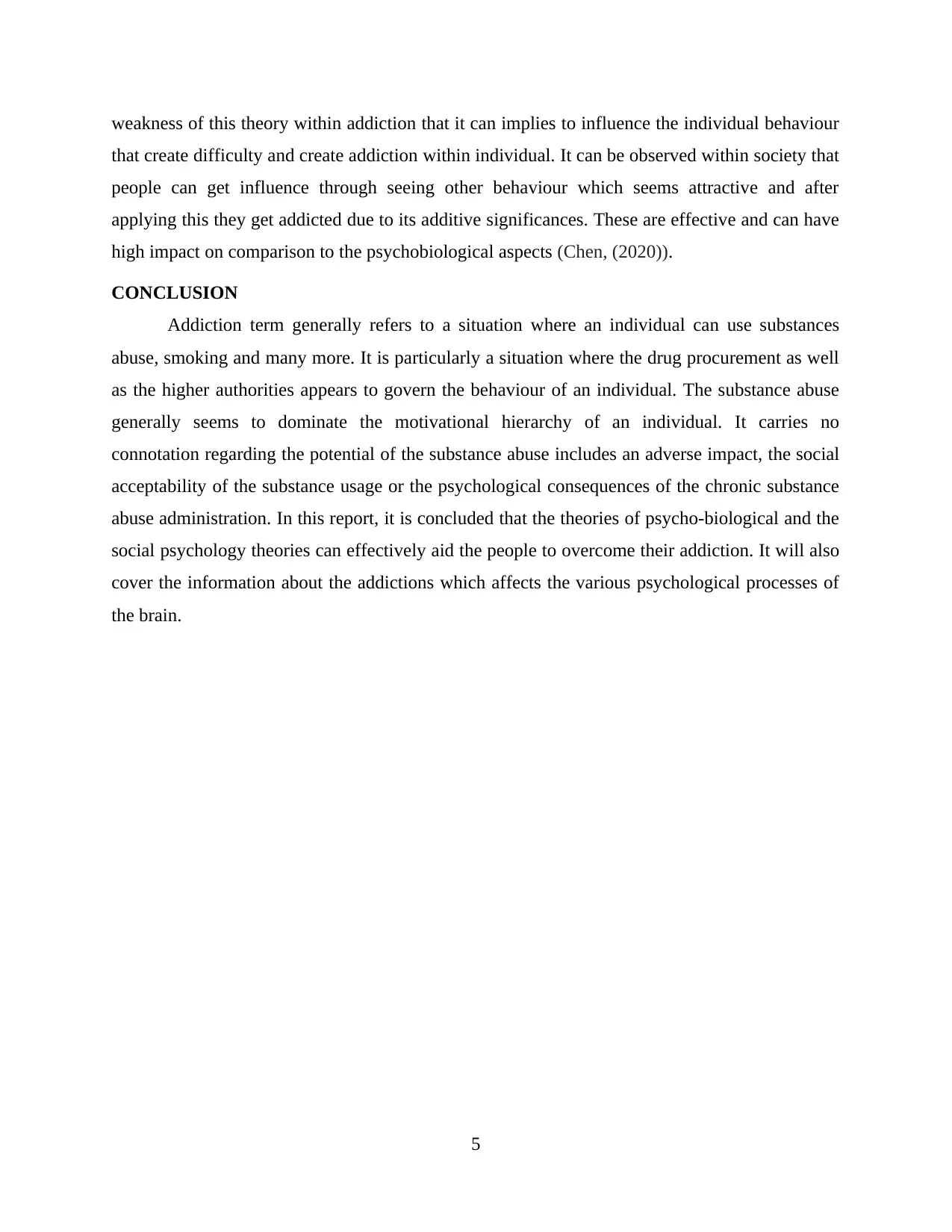
weakness of this theory within addiction that it can implies to influence the individual behaviour
that create difficulty and create addiction within individual. It can be observed within society that
people can get influence through seeing other behaviour which seems attractive and after
applying this they get addicted due to its additive significances. These are effective and can have
high impact on comparison to the psychobiological aspects (Chen, (2020)).
CONCLUSION
Addiction term generally refers to a situation where an individual can use substances
abuse, smoking and many more. It is particularly a situation where the drug procurement as well
as the higher authorities appears to govern the behaviour of an individual. The substance abuse
generally seems to dominate the motivational hierarchy of an individual. It carries no
connotation regarding the potential of the substance abuse includes an adverse impact, the social
acceptability of the substance usage or the psychological consequences of the chronic substance
abuse administration. In this report, it is concluded that the theories of psycho-biological and the
social psychology theories can effectively aid the people to overcome their addiction. It will also
cover the information about the addictions which affects the various psychological processes of
the brain.
5
that create difficulty and create addiction within individual. It can be observed within society that
people can get influence through seeing other behaviour which seems attractive and after
applying this they get addicted due to its additive significances. These are effective and can have
high impact on comparison to the psychobiological aspects (Chen, (2020)).
CONCLUSION
Addiction term generally refers to a situation where an individual can use substances
abuse, smoking and many more. It is particularly a situation where the drug procurement as well
as the higher authorities appears to govern the behaviour of an individual. The substance abuse
generally seems to dominate the motivational hierarchy of an individual. It carries no
connotation regarding the potential of the substance abuse includes an adverse impact, the social
acceptability of the substance usage or the psychological consequences of the chronic substance
abuse administration. In this report, it is concluded that the theories of psycho-biological and the
social psychology theories can effectively aid the people to overcome their addiction. It will also
cover the information about the addictions which affects the various psychological processes of
the brain.
5
Paraphrase This Document
Need a fresh take? Get an instant paraphrase of this document with our AI Paraphraser
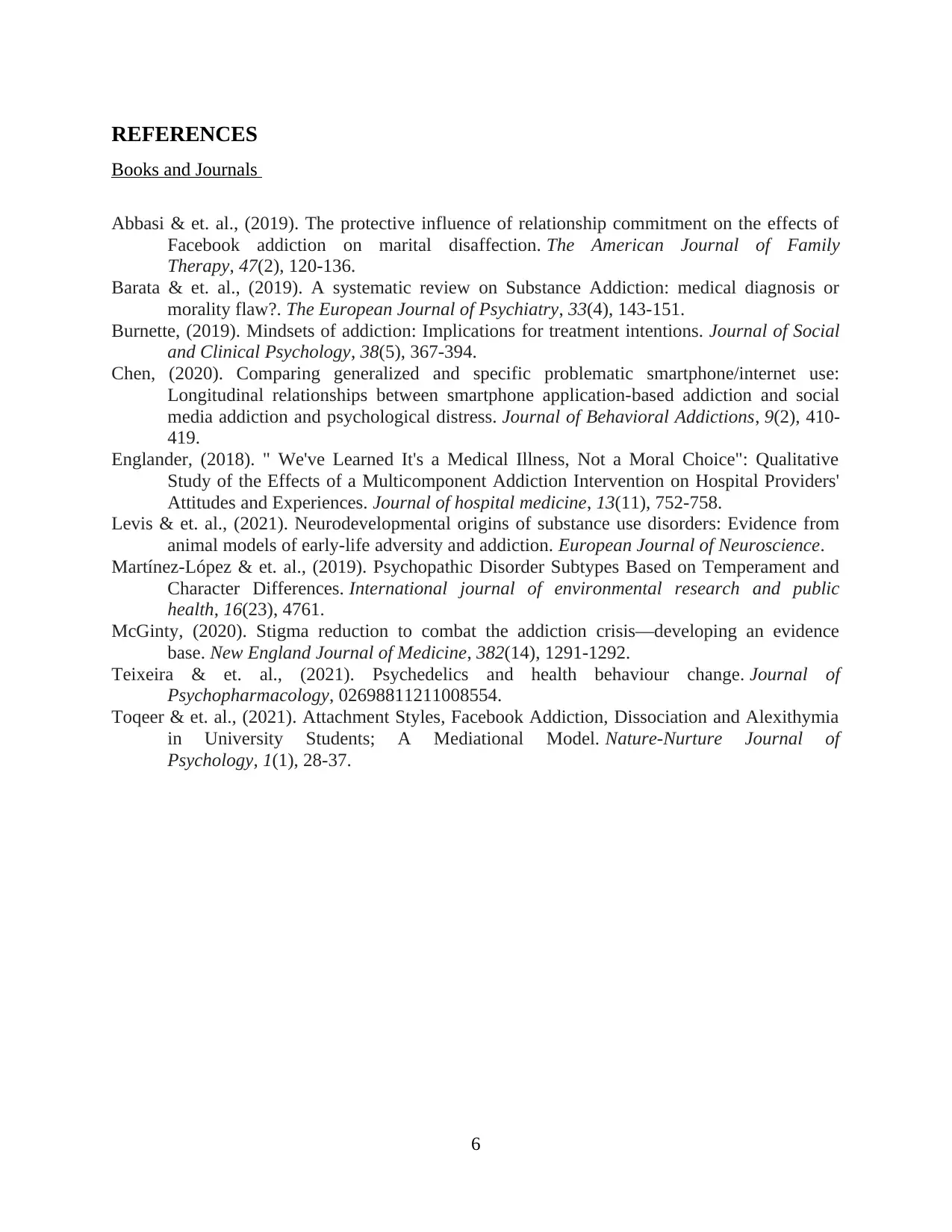
REFERENCES
Books and Journals
Abbasi & et. al., (2019). The protective influence of relationship commitment on the effects of
Facebook addiction on marital disaffection. The American Journal of Family
Therapy, 47(2), 120-136.
Barata & et. al., (2019). A systematic review on Substance Addiction: medical diagnosis or
morality flaw?. The European Journal of Psychiatry, 33(4), 143-151.
Burnette, (2019). Mindsets of addiction: Implications for treatment intentions. Journal of Social
and Clinical Psychology, 38(5), 367-394.
Chen, (2020). Comparing generalized and specific problematic smartphone/internet use:
Longitudinal relationships between smartphone application-based addiction and social
media addiction and psychological distress. Journal of Behavioral Addictions, 9(2), 410-
419.
Englander, (2018). " We've Learned It's a Medical Illness, Not a Moral Choice": Qualitative
Study of the Effects of a Multicomponent Addiction Intervention on Hospital Providers'
Attitudes and Experiences. Journal of hospital medicine, 13(11), 752-758.
Levis & et. al., (2021). Neurodevelopmental origins of substance use disorders: Evidence from
animal models of early‐life adversity and addiction. European Journal of Neuroscience.
Martínez-López & et. al., (2019). Psychopathic Disorder Subtypes Based on Temperament and
Character Differences. International journal of environmental research and public
health, 16(23), 4761.
McGinty, (2020). Stigma reduction to combat the addiction crisis—developing an evidence
base. New England Journal of Medicine, 382(14), 1291-1292.
Teixeira & et. al., (2021). Psychedelics and health behaviour change. Journal of
Psychopharmacology, 02698811211008554.
Toqeer & et. al., (2021). Attachment Styles, Facebook Addiction, Dissociation and Alexithymia
in University Students; A Mediational Model. Nature-Nurture Journal of
Psychology, 1(1), 28-37.
6
Books and Journals
Abbasi & et. al., (2019). The protective influence of relationship commitment on the effects of
Facebook addiction on marital disaffection. The American Journal of Family
Therapy, 47(2), 120-136.
Barata & et. al., (2019). A systematic review on Substance Addiction: medical diagnosis or
morality flaw?. The European Journal of Psychiatry, 33(4), 143-151.
Burnette, (2019). Mindsets of addiction: Implications for treatment intentions. Journal of Social
and Clinical Psychology, 38(5), 367-394.
Chen, (2020). Comparing generalized and specific problematic smartphone/internet use:
Longitudinal relationships between smartphone application-based addiction and social
media addiction and psychological distress. Journal of Behavioral Addictions, 9(2), 410-
419.
Englander, (2018). " We've Learned It's a Medical Illness, Not a Moral Choice": Qualitative
Study of the Effects of a Multicomponent Addiction Intervention on Hospital Providers'
Attitudes and Experiences. Journal of hospital medicine, 13(11), 752-758.
Levis & et. al., (2021). Neurodevelopmental origins of substance use disorders: Evidence from
animal models of early‐life adversity and addiction. European Journal of Neuroscience.
Martínez-López & et. al., (2019). Psychopathic Disorder Subtypes Based on Temperament and
Character Differences. International journal of environmental research and public
health, 16(23), 4761.
McGinty, (2020). Stigma reduction to combat the addiction crisis—developing an evidence
base. New England Journal of Medicine, 382(14), 1291-1292.
Teixeira & et. al., (2021). Psychedelics and health behaviour change. Journal of
Psychopharmacology, 02698811211008554.
Toqeer & et. al., (2021). Attachment Styles, Facebook Addiction, Dissociation and Alexithymia
in University Students; A Mediational Model. Nature-Nurture Journal of
Psychology, 1(1), 28-37.
6
1 out of 8
Related Documents
Your All-in-One AI-Powered Toolkit for Academic Success.
+13062052269
info@desklib.com
Available 24*7 on WhatsApp / Email
![[object Object]](/_next/static/media/star-bottom.7253800d.svg)
Unlock your academic potential
Copyright © 2020–2025 A2Z Services. All Rights Reserved. Developed and managed by ZUCOL.





